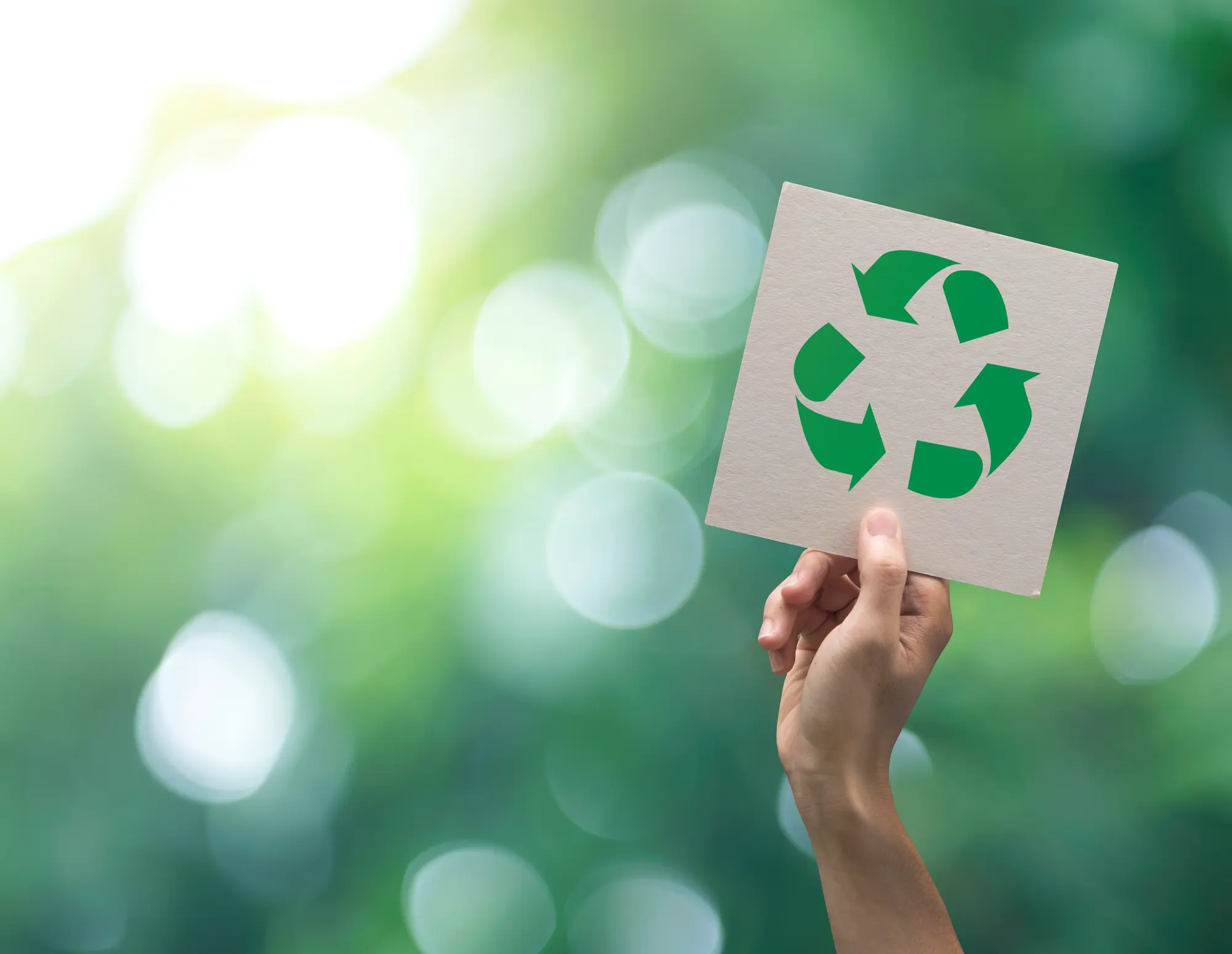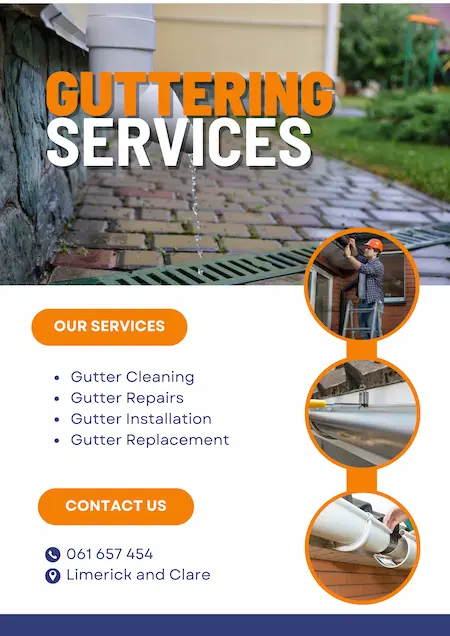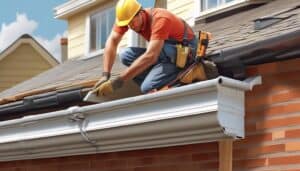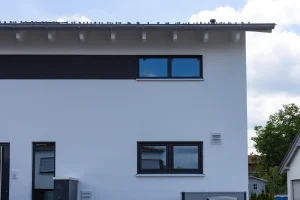Table of Contents
ToggleWhen leaves, twigs, and debris clog gutters, overflow can cause significant environmental problems.
Stagnant water in clogged gutters becomes a breeding ground for mosquitoes, which can spread diseases.
Additionally, overflowing water can erode soil, damage plant life, and increase the risk of basement flooding.
More concerningly, as this water flows untreated into local waterways, it can carry pollutants.
This includes pesticides, fertilisers, and other harmful chemicals.
Embracing sustainable practices in gutter maintenance protects your home and promotes environmental health.
Regularly cleaning your gutters to prevent blockages is essential.
Installing gutter guards can also help reduce the amount of debris that enters your gutters.
This will make maintenance easier and more eco-friendly.
Key Takeaways
-
Clearing gutters and properly disposing of gutter waste is important. It is for maintaining a clean and functional living environment.
-
Improper disposal of gutter waste can introduce toxins into soil and waterways, which can harm local ecosystems.
-
Engaging in eco-friendly disposal methods promotes sustainable waste management. It includes such as composting, recycling, and rainwater harvesting. It benefits both local and global ecosystems.
-
Understanding and following local regulations for gutter waste disposal is crucial. This can protect the environment and avoid fines or penalties.
What are the Common Components of Gutter Waste?
Examining gutter waste, you’ll find it primarily consists of leaves, twigs, and sediment that accumulate in rain gutters over time.
Additionally, gutters can collect dirt and dust from rooftops, which rain then washes into the gutters.
In urban areas, gutter waste might include man-made debris.
These debris are plastic wrappers, metal fragments, and other litter blown or washed into the system.
Moss and algae, especially in shaded or damp areas, can also contribute to blockages.
Occasionally, you may find small animal nests or droppings, showing that pests have used the gutters for shelter.
Regular maintenance and cleaning are crucial to prevent these materials from causing clogs.
This can also cause water damage to your property.
It’s a shared experience that connects you with others who understand the importance of home maintenance.
Handling this chore means you’re contributing to the well-being of your neighborhood and the local ecosystem.
By keeping gutters clear, you prevent water damage and protect wildlife that might be harmed by overflowing debris.
What to Do With Gutter Waste?
Utilize yard waste collection services from municipalities to ensure organic debris is processed.
Mulch organic debris to create nutrient-rich material for gardens.
Bag and transport debris to local allotments for use as natural fertilizer.
Properly dispose of gutter waste in road gullies to prevent drainage clogs and flooding.
Addressing the proper disposal and management of gutter waste is crucial.
This is for minimizing environmental impacts and promoting sustainability in urban areas.
Proper disposal involves collecting the debris and disposing of it in designated green waste bins.
Organic matter from gutter waste can also be beneficial.
It can help create nutrient-rich soil amendments through composting.
Why is Environmental Impact Assessment Important?
EIA is crucial because it helps evaluate how projects and activities affect local ecosystems.
It ensures that environmental protection is integrated into decision-making processes.
It’s crucial to assess how the disposal methods of gutter waste affect you.
By proper disposal of gutter waste, individuals can contribute to a sustainable community.
This community, in turn, supports local ecosystems.
EIAs help identify potential environmental impacts. This is essential for mitigating adverse effects on the environment.
For instance, plastics in gutters can block drains and cause floods. It can also flow into rivers and oceans, harming marine life and ecosystems.
EIAs can determine how plastics might end up in gutters and propose measures to prevent this.
By identifying potential impacts, EIAs help safeguard ecosystems, biodiversity, and natural resources.
In the case of plastics in gutters, EIAs can propose measures to prevent pollution and environmental harm.
Your actions count, and they ripple out, reinforcing a shared commitment to our planet’s future.
What Are Sustainable Disposal Methods?
Several sustainable disposal methods can reduce the environmental impact of your gutter waste.
Being part of a community that cherishes our planet, you know that every small action counts.
Here’s how you can contribute:
-
Composting: Turn organic debris from your gutters into nutrient-rich compost for your garden.
-
Recycling: Separate recyclable materials and dispose of them properly to minimize landfill waste.
-
Rainwater Harvesting: Use gutter waste to create filtration systems. This will allow for the collection of rainwater.
-
Professional Disposal Services: Engage with eco-friendly companies that specialize in sustainable waste management.
-
Professional Gutter Cleaning Service: You can also get in touch with our gutter cleaning experts in Limerick. This is to ensure the safe disposal of gutter waste.
Together, we can make strides toward a cleaner environment.
It starts in our homes with the conscious choices we make.
Embrace these methods, and you’ll not only help the planet but also inspire others in our community to follow suit.
What Are the Benefits of Eco-Friendly Practices?
The benefits of eco-friendly practices include:
-
reducing pollution
-
protecting wildlife
-
preserving natural habitats
-
contributing to global ecosystem health
Adopting these four eco-friendly gutter waste disposal methods can lead to numerous benefits.
This helps both your local environment and global ecosystems.
By embracing these practices, you’re not just cleaning your gutters, you’re joining a community committed to preserving our planet.
You’ll reduce the pollution that harms wildlife and disrupts natural habitats, ensuring that you’re part of the solution, not the problem.
When you make sustainable choices, you’re signalling to others that you care about the future.
This can inspire friends and neighbours to follow suit, creating a ripple effect that amplifies the positive impact.
You’ll feel a sense of pride knowing you’re contributing to a larger movement, one that values the health and beauty of the world we all share.
As a member of your community, it’s important to know that you play a significant role in protecting the environment.
Adhering to the rules will keep us all safe and responsible.
Here’s what you need to keep in mind:
-
Check municipal codes for gutter waste disposal guidelines.
-
Understand the fines and penalties for non-compliance.
-
Know the proper disposal sites for your area.
-
Stay updated on changes to environmental regulations.
-
Choose a gutter cleaning service that understands the impact of eco-friendly disposal.
Frequently Asked Questions
How Does Gutter Waste Contribute to Microplastic Pollution in Waterways, and What Can Homeowners Do to Mitigate This Issue?
You’re tackling microplastic pollution by keeping plastics out of gutters. Install filters, clean regularly, and dispose of waste properly to protect our waterways. Together, we’ll create a healthier environment for all.
Are There Any Innovative Technologies or Start-Ups Addressing the Problem of Gutter Waste Disposal With a Focus on Eco-Friendliness?
You’re part of a community tackling environmental challenges. Innovative startups are emerging, developing tech to handle waste disposal responsibly. They’re creating solutions that align with your eco-conscious lifestyle and values.
How Can Individuals Influence Local Government Policies to Improve Gutter Waste Management and Reduce Environmental Impact?
Can you imagine a cleaner community through action? You’ve got power—attend town meetings, join local eco-groups, and petition for change. Together, you’ll rally neighbours and push policies for better waste management solutions.
Can you compost gutter waste or Recycled in a Way That Is Cost-Effective for Homeowners or Communities?
You can indeed repurpose or recycle gutter waste cost-effectively, creating compost from organic material or recovering metals. It strengthens your community’s bond and commitment to a healthier, more sustainable environment.
What Are the Health Implications for Wildlife and Humans Exposed to Improperly Disposed Gutter Waste, and How Can We Monitor These Effects?
You’re standing on the edge of a health catastrophe if you ignore the toxic threats from mismanaged waste! Together, let’s track these dangers and protect ourselves and wildlife from harm’s deadly embrace.






